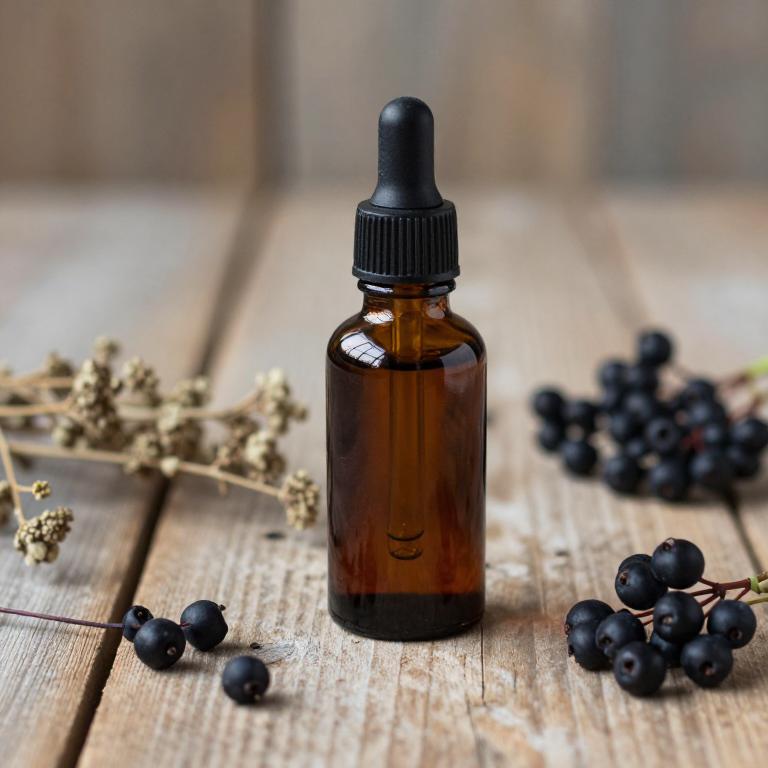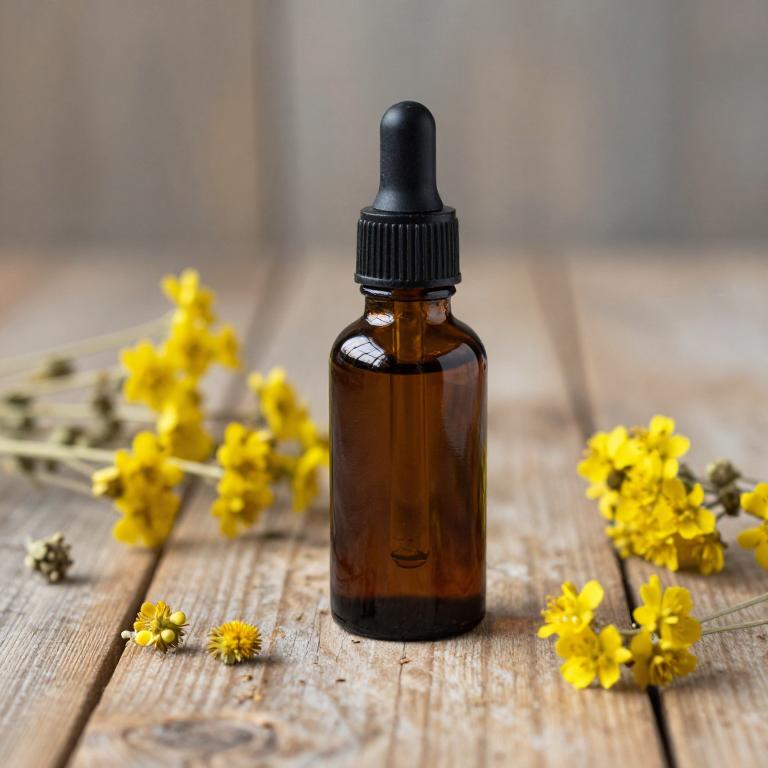10 Best Herbal Tinctures For Strep Throat

Herbal tinctures have gained popularity as a natural alternative for alleviating symptoms of strep throat, often containing ingredients like echinacea, garlic, and goldenseal, which are believed to have antimicrobial and anti-inflammatory properties.
These tinctures are typically made by soaking herbs in alcohol or glycerin to extract their active compounds, making them easy to consume and absorb into the bloodstream. While some studies suggest that certain herbs may support immune function and reduce throat irritation, they are not a substitute for antibiotics in cases of bacterial infections like strep throat. It is important to consult a healthcare professional before using herbal tinctures, as they may interact with medications or be unsuitable for individuals with allergies or specific health conditions.
Overall, herbal tinctures can complement conventional treatments but should not replace them without medical guidance.
Table of Contents
- 1. Echinacea (Echinacea purpurea)
- 2. Thyme (Thymus vulgaris)
- 3. Ginger (Zingiber officinale)
- 4. Black elderberry (Sambucus nigra)
- 5. Stinging nettle (Urtica dioica)
- 6. Licorice (Glycyrrhiza glabra)
- 7. Rosemary (Rosmarinus officinalis)
- 8. Peppermint (Mentha piperita)
- 9. Lemon balm (Melissa officinalis)
- 10. Salvia (Salvia officinalis)
1. Echinacea (Echinacea purpurea)

Echinacea purpurea, commonly known as purple coneflower, is a popular herbal remedy often used to support the immune system.
Its tincture form is frequently recommended for its potential anti-inflammatory and antimicrobial properties, which may help alleviate symptoms of strep throat. While scientific evidence on its effectiveness for strep throat is limited, some studies suggest that echinacea may reduce the duration and severity of respiratory infections. When using echinacea tinctures, it is important to follow recommended dosages and consult with a healthcare provider, especially for individuals with allergies or those taking other medications.
As a complementary therapy, echinacea tinctures may offer some relief but should not replace conventional medical treatments for bacterial infections like strep throat.
2. Thyme (Thymus vulgaris)

Thymus vulgaris, commonly known as thyme, is a herb widely used in traditional medicine for its antimicrobial and anti-inflammatory properties.
Thyme tinctures, derived from the essential oils of the plant, are often utilized to alleviate symptoms of strep throat due to their ability to combat bacterial infections. The active compound thymol in thyme has been shown to inhibit the growth of Streptococcus bacteria, which is a primary cause of strep throat. When used as a gargle or diluted in water, thyme tinctures can help reduce soreness, swelling, and overall discomfort in the throat.
However, it is important to consult a healthcare professional before using thyme tinctures, especially for severe or persistent infections.
3. Ginger (Zingiber officinale)

Zingiber officinale, commonly known as ginger, has been traditionally used for its anti-inflammatory and antimicrobial properties, making it a popular ingredient in herbal tinctures for treating symptoms of strep throat.
These tinctures are typically prepared by soaking grated fresh ginger in alcohol or vinegar, allowing the active compounds such as gingerol and shogaol to be extracted. The warming and soothing effects of ginger can help reduce throat irritation and ease coughing, while its natural antibacterial properties may help combat the streptococcus bacteria responsible for the infection. While ginger tinctures are not a substitute for conventional medical treatments, they can serve as a complementary therapy to support symptom relief.
It is important to consult with a healthcare provider before using herbal tinctures, especially for individuals with existing health conditions or those taking other medications.
4. Black elderberry (Sambucus nigra)

Sambucus nigra, commonly known as elderberry, has been traditionally used in herbal medicine for its potential immune-boosting properties.
While there is limited scientific evidence directly linking elderberry tinctures to the treatment of strep throat, some studies suggest that its high antioxidant and antiviral content may support the body's immune response. Sambucus nigra tinctures are often used as a complementary therapy to alleviate symptoms of respiratory infections, including sore throat and cough. However, it is important to note that elderberry should not replace conventional treatments for strep throat, such as antibiotics, and should be used under the guidance of a healthcare professional.
Due to the lack of standardized dosing and potential interactions with medications, caution is advised when using elderberry tinctures for medical conditions like strep throat.
5. Stinging nettle (Urtica dioica)

Urtica dioica, commonly known as stinging nettle, has been traditionally used in herbal medicine for its anti-inflammatory and antimicrobial properties.
When prepared as a tincture, Urtica dioica may support the body's natural defenses against infections, including strep throat, by reducing inflammation and boosting immune function. The tincture is typically made by soaking the dried leaves in alcohol, allowing the active compounds to be extracted for use. While some studies suggest potential benefits, it is important to consult a healthcare provider before using it for strep throat, as it should not replace prescribed treatments.
Overall, Urtica dioica tinctures may serve as a complementary therapy when used under professional guidance.
6. Licorice (Glycyrrhiza glabra)

Glycyrrhiza glabra, commonly known as licorice root, has been traditionally used in herbal medicine for its soothing and anti-inflammatory properties.
When prepared as a tincture, glycyrrhiza glabra can help alleviate symptoms of strep throat by reducing inflammation and irritation in the throat. The active compounds in licorice root, such as glycyrrhizin and flavonoids, may inhibit the growth of Streptococcus bacteria and soothe mucous membranes. However, long-term use of licorice tinctures can lead to side effects like increased blood pressure due to its effect on cortisol levels.
As a complementary therapy, licorice tinctures may support conventional treatments for strep throat, but they should not replace professional medical care.
7. Rosemary (Rosmarinus officinalis)

Rosmarinus officinalis, commonly known as rosemary, is a herb often used in tincture form to support respiratory health, including relief for symptoms of strep throat.
Rosemary tinctures contain essential oils like cineole and camphor, which have antimicrobial and anti-inflammatory properties that may help reduce throat irritation and fight bacterial infections. When used as a complementary therapy, rosemary tinctures can soothe soreness and ease discomfort associated with strep throat. However, it is important to consult with a healthcare provider before using rosemary tinctures, especially for persistent or severe infections.
While not a substitute for medical treatment, rosemary tinctures may offer natural relief as part of a holistic approach to managing strep throat symptoms.
8. Peppermint (Mentha piperita)

Mentha piperita, commonly known as peppermint, is a popular herb used in tinctures to help alleviate symptoms of strep throat due to its soothing and antimicrobial properties.
Peppermint tinctures can help reduce inflammation and ease the pain associated with throat infections by acting as a natural decongestant and antiseptic. The menthol content in peppermint tinctures provides a cooling effect that can numb the throat and offer temporary relief from irritation and discomfort. While not a cure for strep throat, these tinctures may support the body's natural healing process and complement conventional treatments.
It is important to consult a healthcare professional before using peppermint tinctures, especially for children or individuals with existing health conditions.
9. Lemon balm (Melissa officinalis)

Melissa officinalis, commonly known as lemon balm, is a herbal remedy that has been traditionally used to support respiratory health, including the treatment of symptoms associated with strep throat.
Its tincture form, derived from the leaves of the plant, is believed to have antiviral and anti-inflammatory properties that may help reduce throat irritation and infection. While not a substitute for antibiotics in bacterial infections like strep throat, lemon balm tinctures can serve as a complementary therapy to soothe discomfort and support the immune system. Some studies suggest that the active compounds in lemon balm may inhibit the growth of certain bacteria, potentially aiding in the management of mild throat infections.
However, it is important to consult with a healthcare professional before using herbal tinctures, especially if symptoms persist or worsen.
10. Salvia (Salvia officinalis)

Salvia officinalis, commonly known as sage, has been traditionally used for its antimicrobial and anti-inflammatory properties, making it a potential natural remedy for strep throat.
Herbal tinctures made from sage leaves are often prepared using alcohol as a solvent to extract the active compounds, such as thujone and flavonoids, which may help reduce throat irritation and inhibit bacterial growth. While some studies suggest that sage may have antibacterial effects, more research is needed to confirm its efficacy against Streptococcus pyogenes, the primary cause of strep throat. These tinctures can be used as a complementary therapy alongside conventional treatments, but they should not replace medical advice or prescribed antibiotics.
It is important to consult a healthcare professional before using sage tinctures, especially for individuals with allergies or those taking other medications.